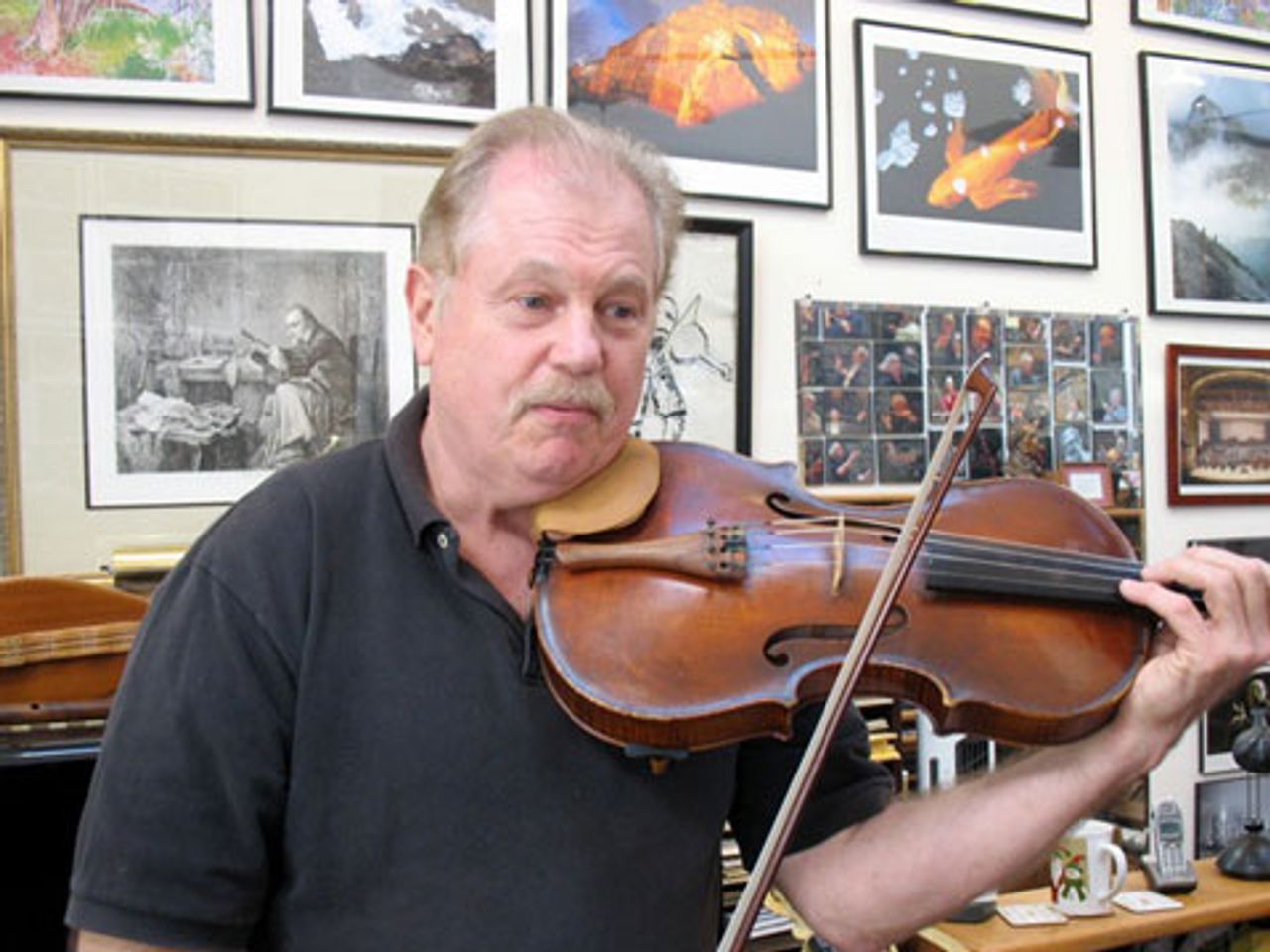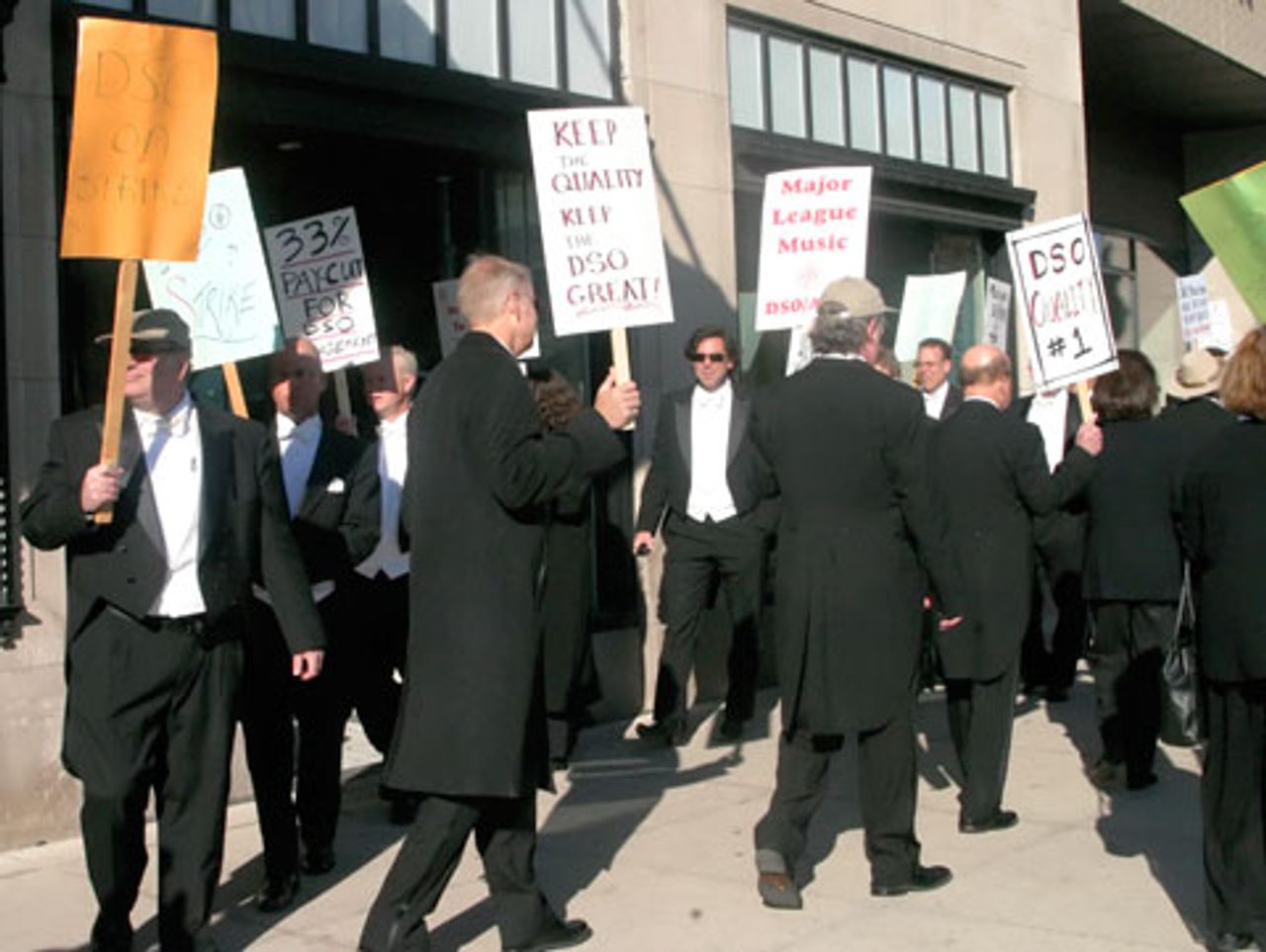The strike by Detroit Symphony Orchestra players enters its third week Monday. The 85 musicians walked out October 4 against management attempts to cut their base pay by 33 percent and the pay of starting players by 42 percent, along with additional cuts in health benefits (which would, in fact, reduce pay by more than 33 percent) and other humiliating demands.
 Hart Hollman
Hart HollmanManagement’s efforts, aided by the national and local media, to whip up public opinion against the musicians, on the grounds that they are highly paid and should be grateful they have positions at all, have largely fallen flat. Considering their training, schedule and expenses, the players make modest incomes, in comparison with the auto company moguls and their Detroit media hangers-on.
This reporter, along with WSWS arts editor David Walsh, spoke to veteran violist Hart Hollman in his studio on Saturday. The remarkable room is adorned with Hollman’s photography, a great passion with him, including an entire wall of photos of conductors and musicians with whom he has played. We were fortunate enough that he also played briefly for us.
Hart explained that he grew up in Allentown, Pennsylvania (at the time an industrial town, in eastern Pennsylvania). He spoke about his musical background. “You don’t get lucky to get into the DSO,” he said. “I have been working every day since I was three years old. Both my parents were concert pianists. They played around the country in the 1930s and 1940s. They were students of Dr. Edwin Hughes [pianist and arranger 1884 -1965]. He was the pedagogue of the piano. My father came from St Louis, and at the age of 11 years he performed the Schumann piano concerto.
 DSO players on the picket line
DSO players on the picket line“I started piano at the age of three … before I could reach the pedals. At age seven, I took up the violin. My parents got me the best teacher in the Allentown area. After two years I won a competition to study with David Madison, associate concertmaster of the Philadelphia Symphony. At age 14, my parents realized my hands were too big for the violin and I switched to the viola. My parents got me the best viola teacher in the country. They knew the value of going to the best teachers.
“I have a student who in February is auditioning for Indiana University. I have other students who know they will never be professional level violists, but I inspire every student that it is something you will have your whole life. Art changes you, it changes your life. It does things that no other human activity can do.”
Hart spoke about the issues in the ongoing Detroit Symphony strike. “What is happening to the DSO is a poster child for what is happening to the arts. This could apply to all the major orchestras. This is scary. It comes down to the issue—‘why support a symphony?’—it is not just for the elites.
“We are on strike to maintain this world class orchestra.
“If what orchestra management wants goes through, we will barely be a Class B orchestra. Right now we have just as good quality as Cleveland and other major orchestras. Our musicians come from all over the world—it is a destination orchestra. Backstage, we hear Russian, Chinese, French, it is a global orchestra. There are Bulgarians and other Eastern Europeans. It is where players want to end up. Not only the orchestra, but the hall is one of the great orchestra halls.
“They keep bringing up our salaries without relating it to anything else. To maintain this ensemble you have to have a high level of musicians that can create this great sound. We are not here to play music nicely. We are here to play it greatly.
“The orchestra proposes to cut our medical benefits. Management doesn’t mention that. The total cut is more like 48 percent. How do we pay for it? We all have houses, kids in college. The instrument costs are beyond belief. Instruments at this level cost thousands and thousands, up to $1 million. An orchestra with top players has to have top instruments.
“I am having to go through my retirement savings to get through this. This is tough on me. It is not a good environment for the musicians. I had a performance to give recently, a new piece, and I was racked by worries about financial problems.
“This is the worst I’ve seen it in 38 years. And I have been through the two big walkouts; 10 weeks and 11 weeks. I have never seen anything like this, where there is no rebound [restitution offered by management]. We know that every other manager at every other orchestra is looking at us for an example for their next contract.”
Hart spoke about the support the DSO musicians have received. “It is a huge and important thing to point out that we are going to have members of the Cleveland orchestra coming to actually play with us next week. They are not just offering verbal support. The Detroit opera musicians are also right with us.”
Hart referred to the recent decision by world famous violinist Sarah Chang to cancel her engagement with the DSO during the strike. “They said she got threatening e-mails, but we said, ‘show us the proof,’ ‘show us the e-mails.’ Nothing. That means management is fabricating it. They are just trying to put us in the worst light possible. It’s the biggest insult I’ve ever seen.”
WSWS: The last 30 years have seen an enormous and systematic cultural regression; You go back, Leonard Bernstein’s concerts for young people were followed. They were national cultural events.
Hollman responded, “We did the Beethoven symphonies and nationally broadcast them. We did DVDs. I just have so much respect for [Antal] Dorati [conductor of the DSO, 1977-81.] This man had a perspective on every part of life. He knew what he wanted and explained that in rehearsal. He had the musicians do an art show. He had it in the lobby of Ford auditorium. He even had some of our stuff framed.
“Dorati could be a bit of a tyrant too, the old school. In Philadelphia the joke was that when [conductor Eugene] Ormandy [of the Philadelphia Orchestra] came back, everyone got well. Ormandy would personally call people if they were sick. He would say, ‘How are you doing?’ … of course he had something else in mind.
“But getting back to the idea of having something world class; that has the highest development of talent and intellect. It has a big impact. For me it was the Philadelphia Orchestra.
“That is the importance of having a world-class orchestra. Here in Detroit we have a world-class art museum, the Detroit Institute of Arts. The Michigan Opera Theatre is a gem. And we have the DSO. We have world-class recordings and are a world-class orchestra. It is important that something like this does not go downhill. The sound is not like something you hear from another orchestra. There is a huge difference. Everyone is playing their part perfectly in time.
“The DSO musicians lead and help all the orchestras in the area. I have played principal viola for 32 years with the Bloomfield-Birmingham symphony. This is what is at stake. We’ve had so many world class musicians come from this area—[violinist and conductor] Joe Silverstein, among others—just a whole group of people who grew up in this area.”
The WSWS noted that the attack on the DSO was part of a broader attack on the working population, that everyone was being asked to ‘tighten their belts’—except the bankers—and that a decent state of affairs for the arts was incompatible with the profit system.
“We do not make profits. Business people are not geared to being in the red. Everything is geared toward being in the black. To be an art director you have to be in it because you love it. And because you know the people you are servicing need this kind of inspiration and it changes the lives of people. It’s the arts that make you human, what separates us from the animals. We are as highly trained as surgeons—we don’t save lives, but we do save souls.
“Studies have shown your best students in high school are also into music. It carries over into everything you do. It is the discipline of being precise. We are trying to reach out to students. Get it into the classrooms. They are the future of symphonic music in the United States. Unfortunately, the first thing to get cut is the arts. Because they don’t show black, they show red. In Europe, they have government support of the arts. You go to Italy—even the guy in the street is singing opera.
“Art inspires you to do things. I played varsity basketball, football, baseball, I played all the sports. Up until my hip replacement, I had done six marathons and 15 triathlons. I have been backpacking for 34 years with the same group of guys. We’ve done every mountain range in this country and been twice to Europe.
“I do four or more hours a day doing photography. I have put together thousands of negatives for a book. We have a publisher in fact.
WSWS: We believe access to the arts should be broadened, so that art is accessible to everyone. It is now going the other direction.
Hollman commented, “What is happening with symphony ticket prices doesn’t make it accessible. Yes, you have some deals for students, but still a lot of people can’t afford it. It is not like a rock concert, where you might spend $100 -$150 to see a top star once a year. But with a symphony orchestra, it is a weekly thing. It really eliminates many people from hearing our concerts.
“What has happened in this country is easy to see, these symphonies have become a real toy of the rich. They are putting money into them, so, in the long run, they can say we are supporters of the symphony, we are classy, buy our product.”
The WSWS asked Hart to discuss his political views.
“I am really not a political person, but I find myself incensed by some of the things going on. The fact is that the arts are not valued. They should be supported. If they can throw all this money into bonds, and even into political campaigns, the amount of money they are spending—I can’t fathom. What happens if that money was put into helping the people?”
“The spread of economic wealth is getting worse and worse, and we are the victims of it. What makes me mad are all these bonuses being paid out. While people are being laid off, all of a sudden these golden parachutes are being handed out. You go to Bloomfield Hills; you see these monster homes being built in this economy. The control is in the hands of a very few people.
“Medical care should be a right. We’re one of the few countries that doesn’t have this. It is medicine for profit. Leonard Slatkin was conducting in Amsterdam. He was conducting there and had a mild heart attack. They had to put in stents. On his way out he asked, ‘How much do I owe you?’ They said ‘Nothing.’ And this for an American coming over. How much would it cost here? It is all about medicine for profit. Look how much these drug companies make.”
Subscribe to the IWA-RFC Newsletter
Get email updates on workers’ struggles and a global perspective from the International Workers Alliance of Rank-and-File Committees.
